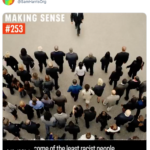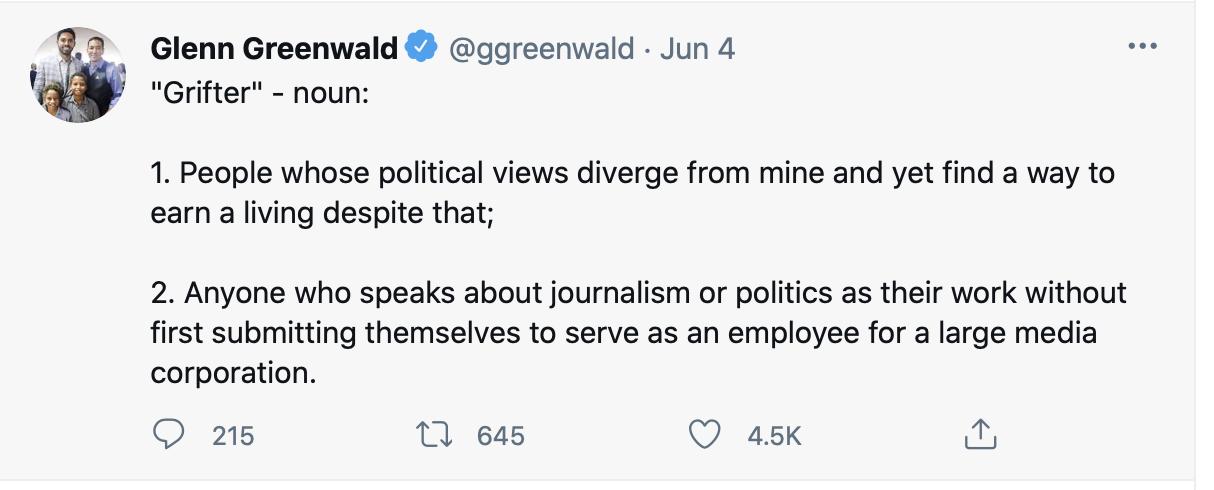Ibram X. Kendi is exulted as an intellectual leader by most people who peddle in Critical Race Theory. The movement is purportedly concerned with "racism." What is racism? Click the image of John McWhorter's Tweet below to watch a one-minute video:

Here is Kendi's definition of "racism" in writing: "A collection of racist policies that lead to racial inequity that are substantiated by racist ideas"
Now ask yourself whether Kendi answered the question or whether he completely evaded answering the question. It should be clear that "racism" is a key term. If his definition wobbles, his entire thought process wobbles. I should also note that I've read other passages by Kendi in which he is similarly (and I suspect, coyly and consciously) circular.
Consider the definition of circular reasoning:
Circular reasoning (Latin: circulus in probando, "circle in proving"; also known as circular logic) is a logical fallacy in which the reasoner begins with what they are trying to end with.. . . Begging the question is closely related to circular reasoning, and in modern usage the two generally refer to the same thing.
Let us substitute to illustrate. What is Communism? "A collection of communist policies that lead to communist inequity that are substantiated by communist ideas"
What is activism? "A collection of activist policies that lead to activist inequity that are substantiated by activist ideas"
As McWhorter suggests above and elsewhere, Ibram Kendi is not a serious thinker (and see here). McWhorter's point in the Tweet is to the extent that people don't hold Kendi to high standards for rigorous thinking, to the extent that they avert their eyes when Kendi embraces circular reasoning of a foundational term of his expansive theory, this is the "soft racism" of assuming that Kendi can't cut it because he is "black." Kendi is thus widely celebrated among the Woke and he commonly gives highly-compensated lectures discussing something he cannot define. Again, Kendi is vigorously embracing circular logic to underpin a term upon which he constructs his entire system. What other highly celebrated "thinker" would be given a pass for such an abject failure?
Notice that Kendi's "definition" or "race," he doesn't mention the common understanding of racism: treating someone badly because they are of another "race." What is "race"? According to Merriam-Webster, "race" refers to "any one of the groups that humans are often divided into based on physical traits regarded as common among people of shared ancestry." In short, "racism" is treating someone badly because they are seen as part of a group of people who look different than other groups of people. You will not hear Kendi ever basing his theory on this common understanding of "racism" because there is so little of it remaining in American society.
IIn many articles at this website, I've attacked the concept of "race. Dividing people by "race" is as irrational as dividing them on the basis of astrology or phrenology. That is why I use so many scare quotes when I discuss "race." That said, "racism" is a real thing in our society, a disgusting and festering attitude with a long history. I've consistently held that even though I do not recognize "race" to be a legitimate way to characterize the personality, history or skills of any person, those who engage in "racism" should be socially ridiculed and sued for any harm they cause. My approach is thus grounded. I'm aware that there are some people who still treat each other badly based purely on personal appearance (e.g, skin tone, hair texture or facial features). This is a bad thing because is impairs human flourishing and harms people, including financially. I have presented a problem that was formerly prevalent, much less so in modern times. I personally know this because I lived through the 50's and 60's. I see how American culture has increasingly and exuberantly embraced "black" people, setting many incentives for hiring minorities and recruiting them as students. 61.2% of "blacks" are now economically categorized as middle class. Kendi rejects every empirical approach to "racism," however, because he wants lawmakers to assume (in the absence of evidence) that all "racial" disparities are the result of racial attitudes. Multivariate analyses are an anathema to Kendi. To a person with a hammer, everything looks like a nail.
For these reasons, Kendi has constructed his entire "anti-racism" theory on his circular definition of "racism" and he doesn't care that he is peddling such slop. And in a stunning display of the soft bigotry of low expectations, Kendi is not called out on this blatant circularity, arguably among the lowest hanging fruit on the tree of logical fallacies. Another key part of Kendi's theory is "structural racism" or "systemic racism." Those terms are equally problematic, as John McWhorter points out in his article, "CAN WE PLEASE DITCH THE TERM "SYSTEMIC RACISM"?" Here is an excerpt from McWhorter's article:
First let’s review what systemic racism means. There are inequities between whites and blacks. The reason is not that blacks are inherently less capable than whites. This presumably means that the discrepancies are traceable to devaluation of black people of some kind at some point in the pathway. This devaluation, even if not conscious, is a kind of racism, and this means that the society “is racist.” Thus the way to get rid of this kind of discrepancy is to undo the racism in the system.
But note that if we take this as a succession of logical statements rather than as a musical sequence valuable primarily because the term racism is intoned within it, then we hit a snag. Just what do we do to undo “racism” that is bound up in a complex system, and especially given that the system has a past that is unreachable to us now, as well as a present?
Here, The Elect burn to insist that, well, systemic racism exists anyway! And you the reader may want to reiterate that systemic racism exists. It does. There are indeed such discrepancies. The question is not whether they exist, but what one does about them.
“Undoing the racism in the system,” in this light, is word magic, not an intelligent prescription for change in the real world. Grouchy? Not really – just grounded.
In Ibram Kendi's world, ubiquitous "systemic racism" is the Holy Spirit.




